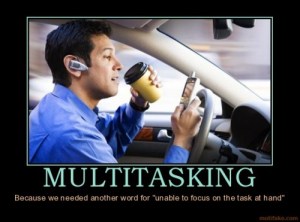Multitasking In A Digital Age
 An argument exists in the field of Education of whether teachers need to adjust to their students and change their methods of instruction, or students need to learn from traditional styles in the classroom and step back from their world of digital world surrounded by technology. Most would agree that it is the teachers and the educational system that must adapt and cater to the student. Marc Prensky suggests that exposure to technology has shaped this new type of student with a “very different blend of cognitive skills than its predecessors.” Because of this new psychological brain structures in today’s generation, teachers in the classroom are pressured to compete with the web and a new type of student.
An argument exists in the field of Education of whether teachers need to adjust to their students and change their methods of instruction, or students need to learn from traditional styles in the classroom and step back from their world of digital world surrounded by technology. Most would agree that it is the teachers and the educational system that must adapt and cater to the student. Marc Prensky suggests that exposure to technology has shaped this new type of student with a “very different blend of cognitive skills than its predecessors.” Because of this new psychological brain structures in today’s generation, teachers in the classroom are pressured to compete with the web and a new type of student.
This student has been molded by technology to believe that school and conversation are generally the same. As a result, many students believe that they can multitask in almost anything they do and are effective in doing so. One MIT student echoes this sentiment when he states that like conversations with friends, “school is the same. You’re paying attention to your professor, you’re emailing another professor, and you’re looking at something else.” This problem of multitasking is a problem that can hinder education regardless of the methods of instruction utilized in the classroom.
Conflicting research has produced various statements regarding the power of the brain. A Sesame Street experiment revealed that children distracted with toys were generally able to comprehend as much of the show as those children who were solely focused on the television. However, this research conducted on five-year-olds may not be as effective as looking at research conducted by Stanford University in examining what really goes on in the brain of those who multitask. Doctor Clifford Nass revealed that virtually all multitaskers believe that they are great multi-taskers, but the general discovery is that they are in fact really lousy at it. Though students may disagree, modern day Psychology and research suggests that some things just cannot be multitasked. In fact, Nass reveals an even more alarming suggestion that multi-tasking “may create people who are unable to think clearly and well.
Is changing the structure and methods of instruction in schools really going to work in successfully educating these students? Is it a plausible argument that changing the system will not really be effective if it is the multitasking that is hindering our students? Students are already distracted and make attempts to multitask in activities that they actually enjoy. Can multi-tasking be effective in any particular situation? Do students need to change as well along with the system and discontinue particular habits and mindsets? Is there a happy medium that exists where students and educators meet to facilitate a more effective transfer of knowledge in the classroom?
Posted on May 9, 2011, in Uncategorized. Bookmark the permalink. Leave a comment.
Leave a comment
Comments 0